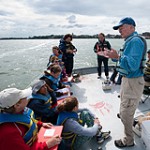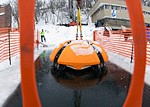Tag Water
Where the invasive things are — and where they could be
Researchers at the University of Wisconsin–Madison's Center for Limnology have launched a new Web site to help assess the threat of aquatic invasive species in Wisconsin's lakes.
Will a well-mixed, warmer lake doom invasive fish?
The rainbow smelt, an invasive fish that threatens native species such as walleye and perch, may soon be feeling the heat - literally.
Slide show: Blooming limnologists
The limnology “major”, one of 18 offered at this year’s Grandparents University, takes grandparents and their grandchildren on to Lake Mendota to collect samples and test the water for oxygen and temperature while aboard Limnos, a 28-foot research boat.
Recent sightings: Icy test drive
Photo: Jeff Miller An underwater robot is lowered by crane into an opening cut in the ice covering…
Resident bacteria may help clean phosphorous from lakes
UW-Madison engineer Katherine McMahon is integrating her expertise in wastewater engineering and in biological systems to study the bacterial community in different eutrophied lakes — two in Madison and one in China — to learn more about how those bacteria affect phosphorus cycling in the lakes.
Lake districts serve as prisms of environmental change
Two vastly different Wisconsin lake districts - one in a dynamic agricultural and urban setting, the other in a forested and much less developed region of the state - are proving their value as sentinels of regional environmental change, according to a new report.
Exhibit traces 300 years of Wisconsin and Great Lakes maps
Original maps of Wisconsin and the Great Lakes region from 17th-century drawings concocted from travelers' accounts to 21st-century images captured by satellites are on display through June 29 in the Department of Special Collections in Memorial Library at the University of Wisconsin–Madison.
Bringing together Earth and sky imagery
Integrating studies of the Earth with those of the atmosphere and beyond, the Environmental Remote Sensing Center (ERSC) recently joined the Space Science and Engineering Center (SSEC) in the University of Wisconsin–Madison Graduate School.
Study shows hope for ridding lakes of clawed invader
A University of Wisconsin–Madison study shows that the rusty crayfish, long seen as a bully in Wisconsin lakes, may be vulnerable to a "double whammy" of intensive trapping and predator fish manipulation to the point where it may be possible to rid lakes of the animal that has vexed scientists, anglers and conservation agencies alike for decades.
Study shows eutrophic lakes may not recover for a millennium
Although it has taken just 60 years for humans to put many freshwater lakes on the eutrophication fast track, a new study shows their recovery may take a thousand years under the best of circumstances.
Storm-water management efforts deter runoff into Lake Mendota
It was easy to blame last spring's flooding in Dane County on record-setting rains. But people are as much at fault as the weather, says Ken Potter, civil and environmental engineering professor.
Lake research offers clues to managing crayfish invasions
Rusty crayfish, an invasive species now crawling across the rocky bottoms of lakes and streams throughout the United States and Canada, may not always have a stronghold once they enter these bodies of water.
Lake restrictions make lakeshore property more valuable
People are willing to pay more to live on a lake that's protected from degradation, often related to lakeshore development.
Researchers track clarity of Wisconsin lakes from space
Assisted by hundreds of volunteers around the state, UW researchers and their partners have developed a method of assessing the water quality of Wisconsin's lakes from space. Using images captured 438 miles above the earth, they have completed the first satellite-based inventory of the clarity of the largest 8,000 lakes in the state.
UW-Madison study returns biology to the basics
We may be living in the age of biotechnology, but science still has some very basic questions to answer. And, one of them is 'What microbes live in lakes?'
Scientists assess shoreline development impact
To understand the ecological effects of lakeshore development on these freshwater ecosystems, UW–Madison has launched an extreme experiment - remove all the woody debris from one lake's shoreline waters and study what happens.
Scientists share in Great Lakes project
Two university scientists will contribute to a $6 million research project that will take a comprehensive look at the environmental health of coastal and near-shore regions of the Great Lakes.
150-year global ice record reveals major warming trend
From sources as diverse as newspaper archives, transportation ledgers and religious observances, scientists have amassed lake and river ice records spanning the Northern Hemisphere that show a steady 150-year warming trend.







